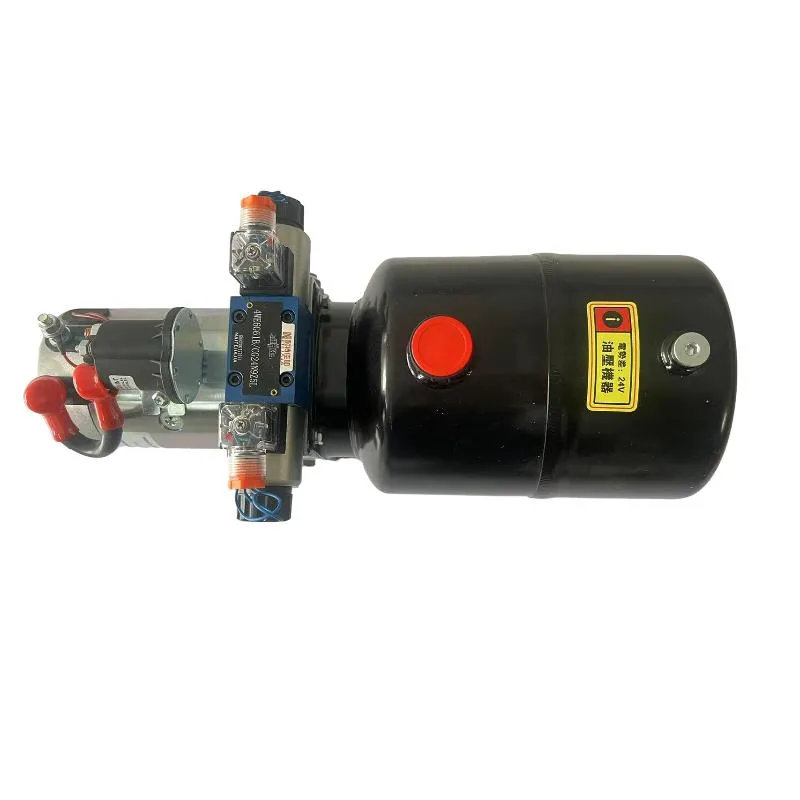Nov . 13, 2024 05:45 Back to list
hydraulic cylinder ram product
Understanding Hydraulic Cylinder Rams Functionality and Applications
Hydraulic cylinder rams play a pivotal role in a vast array of industrial and mechanical applications. These powerful devices convert hydraulic energy into linear mechanical energy and are essential components of numerous systems that require force exertion, movement, or control. This article delves into the functionality, design considerations, applications, and benefits of hydraulic cylinder rams.
The Basics of Hydraulic Cylinders
At its core, a hydraulic cylinder consists of a cylindrical barrel, a piston, and hydraulic fluid. When hydraulic fluid is pumped into the cylinder, it creates pressure that forces the piston to move. This simple yet effective mechanism allows for the generation of significant force in a controlled manner. The performance and efficiency of hydraulic cylinders largely depend on the properties of the hydraulic fluid used, the design of the cylinder, and the specific application requirements.
How Hydraulic Cylinder Rams Work
Hydraulic cylinder rams operate based on Pascal's Law, which states that pressure applied to a confined fluid is transmitted undiminished throughout the fluid. This principle enables hydraulic rams to lift heavy loads effortlessly. The movement of the piston is linear, which means that it can push or pull, making hydraulic rams highly versatile.
The design of a hydraulic ram typically includes the following components
1. Cylinder Barrel The outer tubular structure that houses the piston and hydraulic fluid. 2. Piston A sliding disc or plunger that moves within the cylinder. The force exerted by the fluid acts upon the piston. 3. End Caps These secure the hydraulic fluid within the cylinder and prevent leaks. 4. Rod Attached to the piston, it extends outside the cylinder to exert force on external objects. 5. Seals These are critical for preventing hydraulic fluid from leaking and maintaining pressure within the system.
Applications of Hydraulic Cylinder Rams
Hydraulic cylinder rams are utilized in various industries, including construction, manufacturing, automotive, and aerospace. Some common applications include
1. Construction Equipment Hydraulic rams are integral to machinery such as excavators, bulldozers, and cranes, where they help lift heavy loads and perform various tasks with precision and ease. 2. Manufacturing Processes In factories, hydraulic rams are employed for pressing, punching, and molding materials. They enable the automation of production lines and enhance overall productivity.
3. Automotive Industry Hydraulic rams are used in vehicles for jacking, lifting, and even in braking systems. They provide the necessary force for mechanical operations, ensuring vehicle safety and functionality.
hydraulic cylinder ram product

5. Marine Industry Hydraulic rams assist in operating thrusters, hatch covers, and cranes on ships, showcasing their versatility in diverse environments.
Benefits of Hydraulic Cylinder Rams
The significance of hydraulic cylinder rams extends beyond their functionality; they offer numerous benefits
1. High Power-to-Weight Ratio Hydraulic systems can exert substantial force without the need for bulky machinery, making them efficient and space-saving.
2. Precision Control Hydraulic rams allow for smooth and precise control of movement, making them ideal for applications requiring exact positioning.
3. Durability When properly maintained, hydraulic cylinder rams are long-lasting and can operate under severe conditions. They are designed to withstand high pressures and are less prone to mechanical failure compared to other systems.
4. Versatility Their ability to be customized for various applications makes hydraulic rams suitable for a wide range of industries and tasks.
5. Safety Features Many hydraulic systems come with safety mechanisms to prevent catastrophic failures, ensuring operator safety during operation.
Conclusion
Hydraulic cylinder rams are indispensable tools in modern industrial and mechanical processes. Their ability to provide substantial force, precision, and versatility makes them critical components in many applications, from construction and manufacturing to automotive and aerospace. Understanding their functionality, design, and applications is essential for anyone involved in fields that rely on hydraulic technology. As industries continue to innovate and advance, hydraulic cylinder rams will undoubtedly remain at the forefront of engineering solutions.
-
Fork Lift Power Units - Hebei Shenghan | Efficiency, Reliability
NewsJul.13,2025
-
1.5-Ton Turbocharged Cylinder-Hebei Shenghan|Hydraulic Solution,Energy Efficiency
NewsJul.13,2025
-
Auto Hoist Power Units-Hebei Shenghan|Efficiency&Industrial Lifting
NewsJul.13,2025
-
Double Acting Power Units-Hebei Shenghan|Hydraulic Solutions,Industrial Efficiency
NewsJul.13,2025
-
1.5 Ton Lifting Cylinder 70/82-40-290-535 - High-Performance Hydraulic Solution | Hebei Shenghan
NewsJul.13,2025
-
Fork Lift Power Units - Hebei Shenghan | Efficiency&Reliability
NewsJul.13,2025
